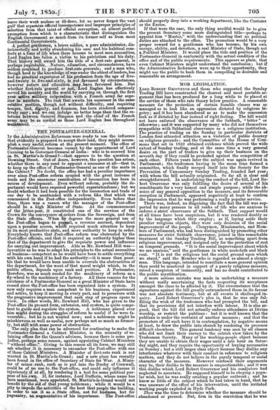THE POSTMAST.ER-GENERAL.
IF the Administretkee Reformers- were ready to use the influence that evidently is peepaeol ito. accept their lead, they might accom- plish a very useful reform at the present moment. The office of Postmaster-General becomes vacant by the appointment of Lord Canning to be Governor-General of India : who is to succeed him in St. Martin's-le-Grand ?—that appears to be the question at Down* Street. Out of doors, however, the question has arisen, whether there is any need to appoint a successor at all—that is, to keep up the office of Postmaster-General as one of the seats in the Cabinet ? No doubt, the office has had a peculiar importance ever since Post-office reform coupled with the great increase of trade and the enormous ramification of locomotion has been in course of development. Even without reform, probably the de- partment would have required powerful superintendence ; but we doubt whether it had been possible for the locomotion and trade of our day to be unattended with a reform like that which was commenced in the Post-office independently. Even before that time, there was a reason why the manager of the Post-office should be a high Minister of State. At the commencement of the letter-poet, it constituted one of the services of the Crown for the conveyance of orders from the Sovereign, and from the State officers. When by degrees the more general use of the Post-office began to premail, a revenue accrued, dependent upon a peculiar source, which required much attention to keep in its most productive state, and more authority to keep in order. Everybody knows that Fost-office reform was obstructed by the Post-office officials, and that it required an authority higher than that of the department to give the requisite power and influence for carrying out improvement. Able as Mr. Rowland Hill was— inventive as he was to adapt his principles to the actual necessities of business—competent as he would have been to settle everything with his own hand if he had the authority—it is more than possi- ble that he would have been unable to overrule the obstructives of the department, for the want of that moral weight which, in the publics offices, depends upon rank and position. A Postmaster, therefore, was as much needed for the machinery of reform as a fly-wheel to the machinery of a factory. All these reasons for the existence of a Postmaster-General as a great Minister of State have ceased since the Post-office has been organized into a system. It now only requires a man competent to his business, experienced and active, to keep it moving in every part, and to persevere with the progressive improvement that each step of progress opens to view. In other words, Mr. Rowland Hill, who has given to the Post-office its present form, extension, and system, is quite compe- tent to guide and regulate the system. A nobleman placed over him might during the struggles of reform be useful if he were fa- vourable; but he is not wanted now; and a nobleman might be mischievous as well as useful, now perhaps not so much as former- ly, but still with some power of obstruction. The only plea that can be advanced for continuing to make the Postmaster-General a Cabinet Minister, is the necessity of re- Mining offices for the Queen's advisers, because there is some pre- judice, perhaps some reason, against appointing Cabinet Ministers "without office." Giving to this reason all its force, we may still ask whether it is necessary to encumber the Post-office with one of those Cabinet Ministers. A Minister of first-rate rank is not wanted in St. Martin's-le.Grand; and a neiv place has recently been found in the office of Secretary of State for War. A Minis- ter of minor, rank, such as is put into the Duchy of Cornwall, co.uld be of no use to the Post-office, and could only influence it injuriously if at all, by rendering it a tool for some political pur- pose of his pwn. If, for instance, Lord Dufferin, whose name has been niened, were appointed, St. Martin's-le-Grand would not benefit by the nid of that young nobleman ; while it would be a pity to impede the activities of the host that people the building, an order to use it as a State office, not for business, but for pageantry, an augmentative of his importance. The Post-office
should properly drop into a working department, like the Customs or the Excise.
If that were the case, the only thing needful would be to give the present Secretary some more distinguished title—perhaps to appoint him " Master, ' with the understanding that no political duties are attached to the office. The promotion would be a very proper reward for a gentleman who has become, by his own energy, ability, and devotion, a real Minister of State, though not aYolitical Minister. It would place the title and position of the Postmaster-General in conformity with the actual condition of the office and of the public requirements. This appears so plain, that even Cabinet Ministers might understand the conclusion; but if. the Administrative Reformers were up to their opportunity, they might use the public to back them in. _compelling so desirable and reasonable an arrangement.


























 Previous page
Previous page